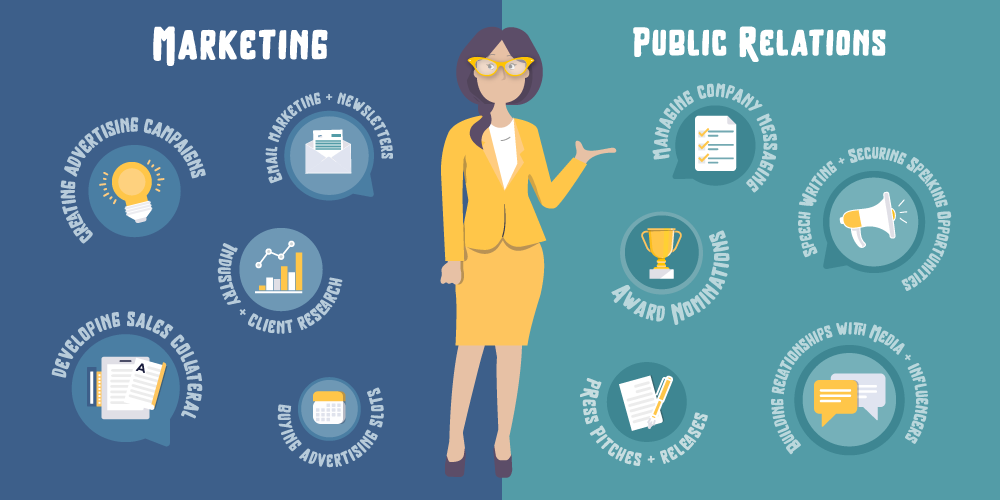A public relations specialistis someone who generates and maintains their employer or customer's favorable public image. You compose media publications, organize and direct public relations and raise funding for your group.
PR experts endeavor to communicate the message of an organization to the public and establish and nurture a positive public image for the company. They seek to shape their employer's public perception and make the public aware of their work and objectives. They do this through communicating efficiently with the media, including the preparation of reports and the answering of press requests for information.
What Does A Public Relations Specialist Do?
The following are frequently done by public relations specialists:
- Write media communiqués and provide media information
- Determine the best strategy to contact major customer groups and audiences
- Respond to media queries or select a relevant speaker or source of information
- Assist customers with efficient public communication
- Develop and preserve the image and brand of your company using logos and signage
- Prepare and conduct interviews for senior leaders of a company
- Evaluate publicity and promotion strategies to determine compatibility with the public relations efforts of your organization.
- Develop and implement financing strategies to find and contact potential donors and apply for grants for an organization
Public relations specialistscommunicate with the public of an organisation, including consumers, investors, journalists and other media specialists. They can be referred to as press secretaries in government. They update the public on government officials and agencies' activities.
Specialists in public relations must comprehend the views and concerns of the groups with which they work in order to sustain cooperative ties. They produce press releases and communicate with media individuals who can print or transmit their stuff. Many special reports on radio or television, newspaper stories and magazine articles are being written by specialists in public relations. A press release, for example, could explain what the public has done to promote something, like health, energy or the environment. In addition to traditional media publications, publications are more and more disseminated over the Internet and social media.
Public relations specialists often support corporate eventsto ensure that their company or customers retain and improve their image and identity. They also help clarify the point of view of their organisation, in media releases and interviews, to its major public. You monitor social, economic and political trends and offer strategies of improving the image of the corporation based on these trends. For instance, an oil corporation may launch a publicity campaign to advertise its efforts in developing cleaner fuels in response to growing environmental concerns.
Public relations experts can supervise a workforce in huge corporations. They will also collaborate with publicity and marketing personnel to ensure that advertising campaigns are compatible with the image that the firm or customer attempts to present. The manager of public relations, for example, ensures that the group receives current advertisements when it decides to make an appeal to a given population, such as younger people.
They can also handle internal communications, such as newsletters for businesses, and aid financial managers to prepare reports for the organization. They may help top management through the preparation of speeches, interviews and other kinds of public contact with the organization.
Specialists in public relations must be able to work well with many other types of professionals to report the facts accurately. The information they write in some situations has legal implications. You must work with the lawyer of the firm or customer to make sure that the information it publishes is both legal and publicly accurate.
Qualifications and education requirements
Although the public-relations sector requires no standard education, businesses usually prefer to recruit employers that have a Bachelor's degree from college.
Education: Many people have been involved in public relations, marketing, journalism, communications, businessor publicity.
Experience: Employers also want to have a job and to be able to exhibit a portfolio of sample work both from internships and in the department of school communications.
Qualifications And Education Requirements
Although the public-relations sector requires no standard education, businesses usually prefer to recruit employers that have a Bachelor's degree from college.
- Education: Many people have been involved in public relations, marketing, journalism, communications, businessor publicity.
- Experience: Employers also want to have a job and to be able to exhibit a portfolio of sample work both from internships and in the department of school communications.
Skills & Competencies In Public Relations
Those who wish to work as specialists in public relations should be able to do softly:
- Verbal communication: your work needs that the public, the media and other members of your organization get information efficiently.
- Listening: You will also have to listen attentively to see what others say and answer properly.
- Writing: Since it is a regular component of most PR specialists' job to write press releases and speeches, great writing abilities are necessary.
- Interpersonal: Your relationship with the media and the general public calls for a good relationship with others. You must be convincing and negotiable. Also, you must coordinate actions with others, including your colleagues, in your capacity as a PR specialist.
Experience Professional
On-the-job experience is no replacement. With more expertise gained by public relations specialists, their pay generally improves. Employers often look for applicants of 2 or 5 years of work experience when assessing specialists in public relations and for potential employers candidates with a bachelor's degree in communication. Communication leaders are often taught, particularly in the context of a careerin public relations, to stay up-to-date with media trends.
Network Building
Another key issue for budding PR specialists as well as for veterans is networking with well-connected persons. The bigger the network of a person, the easier it might be in a competitive market to locate a work. Membership networking opportunities and skill training are provided by organisations like the PRSA (Public Relations Society of America) and the International Association of Business Communicators (IABC).
How Much Does A PR Specialist Make?
Depending on geography, experience and employer, the income of a public relations professional may vary.
- Annual average pay: 59,300 dollars
- Annual wage of top 10%: $112,260
- Annual salary: $32,840 Bottom 10 percent
How Long Does It Take To Be A Public Relations Specialist?
A public relations campaign(PR) for public relations and stakeholders is developed and implemented in order to retain the company's perspective. It assesses the objectives, promotional policies of the organization, and needs to develop strategies for media relationsthat affect public opinion and market products and services. It prepares, edits and updates advertising materials and publications such as newsletters and videos.
You need a Bachelor's degree in PR, or a related function with a minimum of 5 years of experience in the same role as a public service worker. In order to boost your chances you can receive an APR certificate. However, it is essential that you employ video/photo editing software and project management. You need communication, interpersonal communication, adaptability, creativity, strategy, organization and problem resolution abilities as well. You also need to be experienced in media relations management. Public Relations' compensation varies from $34,000 to $62,000. Its average annual pay is $46,159.

Working in Public Relations | All About PR
Is Public Relations A Dying Career?
Over the past ten years, full-time journalists and journalists in the United States have decreased by more than 50%, while national and regional journalists' numbers have fallen by more than 30%. There are news deserts — places without local news — and a culture in which bogus news is confronted by truth.
This upheaval has only reacted fitly by the PR business. Agencies and customers have tried to focus their attention with a revived interest in creative storytelling, brand news and acquired channels.
Yet an unwavering concentration persists on a media relations agenda shaped by the long defunct old model of mass communication. When we speak to customers of how tomanage their PR initiatives and what KPIs they have, it is generally a discussion of 'hits.'
More than one anecdote I've heard from the CEO of Fortune 500, who only aims to hedcut a Wall Street Journal.
Forrester Research demonstrates that brands struggle to understand the new economics of influence. Among the B2B companies with which I am talking, the public relations budget has been steadily declining for a few years.
Yet an unwavering concentration persists on a media relations agenda shaped by the long defunct old model of mass communication. When we speak to customers of how to manage their PR initiatives and what KPIs they have, it is generally a discussion of 'hits.'
More than one anecdote I've heard from the CEO of Fortune 500, who only aims to hedcut a Wall Street Journal.
Forrester Research demonstrates that brands struggle to understand the new economics of influence. Among the B2B companies with which I am talking, the public relations budget has been steadily declining for a few years.
These gains, however, often focus closely on demand: ultimate-mile, intent-oriented targeting, which completely ignores the influence of the brand. The most common question I hear from customers is how to quantify brand impact efficiently.
This debate frequently becomes an attribution, not awareness or reputation conversation. We measure and invest in what we count. We measure. In this approach, investments are distracted from branding, the core of successful PR programmes, and the frequently arbitrary links between a marketing tactic and a potential customer.
And short-term investments in building meaningful interactions with stakeholders are not encouraged and the public relations resources further degrade.
Conventional public relations—or at least media relations—can turn into a relic of the past. It is a problem for agencies and brands and an opportunity.
Brands journalism is now relevant, with many organizations influencing news reports and news values by observing them carefully. Brands used to think of news sources as news providers: One customer said "if you have access to the news, if you are the news, why not send the news?" during the pandemic?
It is a talent shortage that brands know that they lack the ability to do the job successfully, both journalistically and storytelling. Brands don't need to recruit former reporters. However, it is new to see this attempt succeed since journalistic skills are respected.
What's The Difference Between PR And FR And Marketing?
It's difficult to disentangle PR from marketing for many, including industry pros. Social media have only increased the confusion in recent years by further blurring the two's distinctions. The many overlapping aims and often collaboration cause considerable confusion. However, while final goals may be closely related, their approaches to reach those goals differ significantly. As a creative business that provides services for both pr and marketing and often for the same customer, it is crucial that each activity is clear.
Although both initiatives increase the company's standing, their strategy, focus and success measurements differ widely. This is a collapse.
Target Audience
Marketing: Current or potential consumers
PR: All stakeholders, media and the public at large
Primary Focus
Marketing: Conducting advertising and other marketing initiatives that will result in increased sales.
PR: Managing messaging and communication channels to maintain a positive brand awareness and building relationships.
Superpowers
Marketing: The power to sell. Advertising and other forms of direct marketingare the shortest route to increased sales.
PR: The power to change minds. Messages can be more influential when received through PR channels, as articles and other third party sources are perceived as more credible than ads.
Measuring Success
Marketing: Success is generally measured by increases in sales revenueand realizing short term results.
PR: Gaining positive media exposure and influencing a positive change in perception. Generally focused on more long term results.
Daily Activities
If you’re still struggling to separate PR and marketing, think about the activities a professional might conduct over the course of a day.
In accomplishing the long-term and short-term aims, pros and marketing play a significant role. We appreciate that not all companies can integrate these tactics alone. It requires a lot of time, conciseness and a dash of magic. If you look towards an external team like Direct Development, you can start your business or coordinate marketing activities every day to maximize your business' success.




